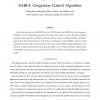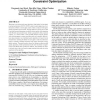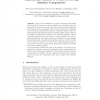134 search results - page 2 / 27 » Experimental analysis of privacy loss in DCOP algorithms |
COMAD
2008
13 years 7 months ago
2008
Publishing a database instance containing individual information poses two kinds of privacy risk: presence leakage, by which the attackers can explicitly identify individuals in (...
NETWORKING
2004
13 years 7 months ago
2004
Several new protocols such as RBUDP, User-Level UDP, Tsunami, and SABUL, have been proposed as alternatives to TCP for high speed data transfer. The purpose of this paper is to an...
ATAL
2003
Springer
13 years 11 months ago
2003
Springer
We present a new polynomial-space algorithm, called Adopt, for distributed constraint optimization (DCOP). DCOP is able to model a large class of collaboration problems in multi-a...
SDMW
2004
Springer
13 years 11 months ago
2004
Springer
The recent investigation of privacy-preserving data mining and other kinds of privacy-preserving distributed computation has been motivated by the growing concern about the privacy...
PVLDB
2011
13 years 21 days ago
2011
With the recent surge of social networks such as Facebook, new forms of recommendations have become possible – recommendations that rely on one’s social connections in order t...



